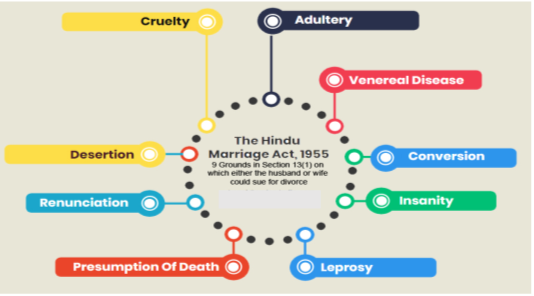Marriage is one of the most important custom in any religion. It is believed that a man and a woman only become complete upon marriage, before which both of them are only half of themselves. Marriage has been considered as an indissoluble union whose bond once joined, continues for many lifetimes to come.
Hearing the religion’s perspective on marriage, we forget that the sole purpose of marriage is commitment, companionship and respect for one another.
The colour of marriage fades when one of the spouse strays away from their responsibility towards the marriage and their partner.
Acts of infidelity, loss of interest in the partner, harassment, dowry demands, ego clashes etc, break the very foundation of marriage which was built on the day they took their vows towards each other.
At this point, it becomes extremely difficult of the couple to stay together and even on the issue of divorce, the couple starts disagreeing on each and every issue. Sometimes, while one may wish to leave their marital relationship, the other might not be ready for divorce yet. The helpless question arises, what must be done? Should we stay in an unhappy or abusive marriage till the end?
What to do if living in an unhappy or abusive marriage?
The Hindu law provides for 9 types of grounds for divorces, they are:
- Adultery: Adultery, basically means to have an extra marital affair with some other person who is not your spouse. Earlier, adultery was mentioned in the Indian Penal Code, making adultery a crime. Thus, any person who committed the act of adultery, could be jailed or pay a hefty amount of compensation.
But, in 2018, The supreme Court through a judgement, declared the law of adultery illegal and removed it on the ground that it was discriminatory towards women and gave the autonomy of women to their husbands. Even though adultery is no more a crime, a person can still approach the court of law and plead for divorce on the ground of adultery.
It is very hard to catch someone red handed in the act of adultery, thus direct evidences or direct links to evidences are almost hard to collect. Thus, Circumstantial evidences play a major role in such situations, such as:
- Circumstantial proof, where the husband has spent time alone in closed spaces with someone else.
- Evidence of birth of his children with someone else.
- Any venereal disease contracted by the spouse from someone else.
- Any proof of him visiting the house of the other woman
- Recordings of admission and confession by the husband
- Witnesses, recordings, photographs, videos (in connivance to the provisions of the Indian Laws)
- Clear association with the other party, etc.
Evidences such as mentioned above are not direct evidence. They are individually not sufficient to make someone look guilty of cheating or having an extra marital affair, but when presented together with facts and situations, they lead to the irresistible conclusion of the commission of adultery or the act of extra marital affair.
- Grave Mental Disorder or Insanity: In many cases, a person can approach the court for divorce if they believe that their partner is suffering from severe mental illness or unsoundness of mind, during the course of the marriage. There can be situations, where a person was of sane mind during the solemnization of marriage but during the course of or many years of marriage the person has become of unsound mind. In both the above situations, a decree for divorce can be requested.
This means that any person who is not capable of leading a normal married life or fulfil the responsibilities associated with it at any point is a person said to be of unsound mind. Thus, judicial separation can certainly be obtained if the person has been “incurably of unsound mind,” or has been suffering continuously or intermittently from “mental disorder of such a kind and to such an extent that the petitioner thus cannot reasonably be expected to live with the respondent”.
Major mental disorders have always been considered as important elements in marriage and are listed both as preconditions of marriage and as grounds for divorce.
- Communicable Venereal Disease: Any communicable disease which is contracted through sexual intercourse is referred to as communicable venereal disease. Syphilis, Gonorrhoea, AIDS, are some of the recognised venereal diseases in India.
- Conversion: Any Hindu marriage can be dissolved by the competent court on the ground that one of the spouses has ceased to be a Hindu by converting to another religion. This is done so that when a person changes their religion, their spouse must not have to keep up with the conjugal duties and rights with a person of separate religion. Relinquishing of Hindu religion doesn’t mean mere professing or theoretical knowledge of the other religion. It must be voluntary relinquishment through a formal ceremony.
- Cruelty: Mental as well as physical cruelty both constitutes the ground of cruelty. This is the most common ground for divorce. Physical cruelty occurs when a person physically causes any harm or bodily injury to their spouse. While mental cruelty consists of mental torture or bad behaviour or hurling of verbal abuses towards their spouse. Any act that can cause mental cruelty or physical cruelty, upon presentation of appropriate evidences and witnesses, can be a ground for dissolution of marriage.
- Desertion: Desertion as the name suggests occurs when a person leaves their spouse without their consent and any valid reason or justification. Under this ground, when a person denies to fulfil their obligation as a married partner to their spouse, the deserted spouse can claim for divorce.
- Leprosy: Leprosy is basically a communicable, infectious disease of the skin that penetrates into the nervous system, mucus membranes, etc. Only a ‘virulent and incurable’ form of leprosy can be a valid ground for divorce. Such a contention that the spouse is suffering from virulent and incurable form of leprosy must be proved through appropriate expert opinion and medical reports.
- Renunciation of the World: When a person renounces the world, basically leaves the world to follow the path of god & distances self from civilization, then their spouses can approach the competent court to request for a decree of divorce.
- Presumption of Death: As per the Hindu law, a person is presumed to be dead if not heard alive to family and friends for at least seven years. The burden to prove the death of such a person is on the spouse seeking divorce.
How can I apply for contested divorce?
Going through the process of divorce can take a toll on any individual, especially if the marriage has ruptured due to any of the above reasons. A person can apply for divorce on any of the above ground by following the below mentioned steps-
- Consulting a lawyer
- Collection of all evidences and witnesses
- Filing of petition by the husband or wife
- Issuing of Summons and appearances
- Reconciliation attempt by the Court
- Reply/counter reply from the respondent spouse
- Filing of Interim applications, if any.
- Examination and cross-examination of witnesses and evidence.
- Decree of divorce passed by the court.
- Petition of Appeal, if any.

How can GS Bagga & Associates help you?
Greetings! When people marry, they do so with a hope of spending a lifetime together, sharing joys and sorrows together. Sometimes, marriages do not work out as while living together, its realized that they are not able to cohabit together or with their spouse and it would be best to part their ways. In such situations, lawyers play a major role in getting you a divorce. The offices of G.S. Bagga & Associates have been experienced in family law and matrimonial issues for over 7 years now. If you’ve found the above information satisfying, you can get in touch with us and can book a free consultation. We would love to support you with our legal expertise in the matter. Feel free to contact us, anytime.


